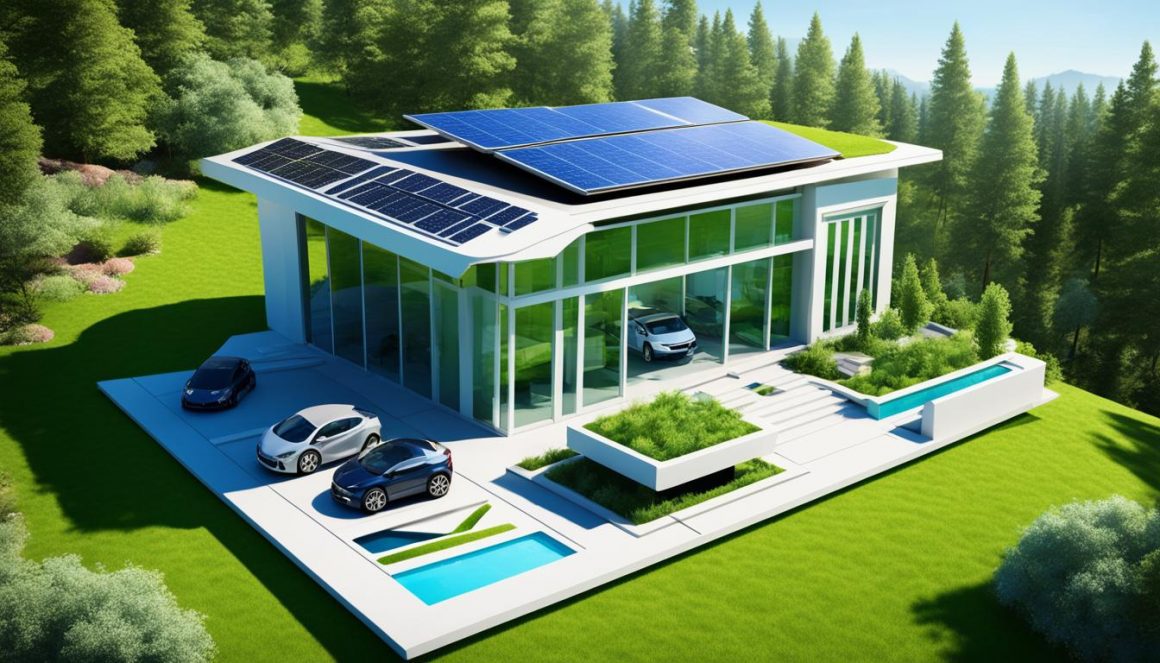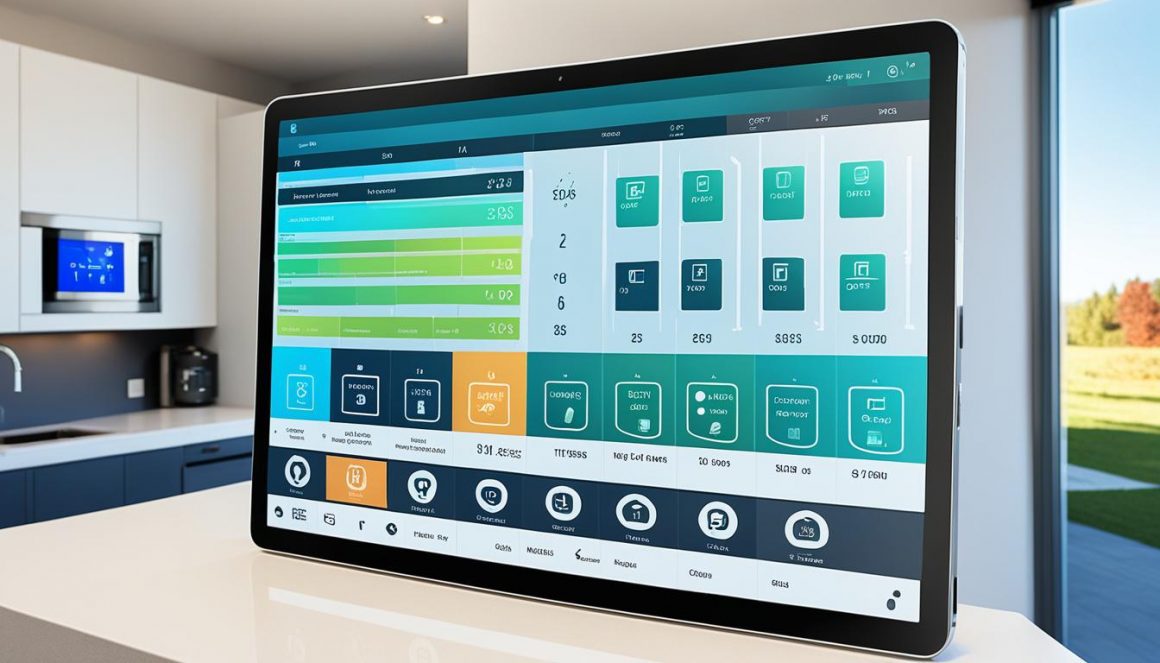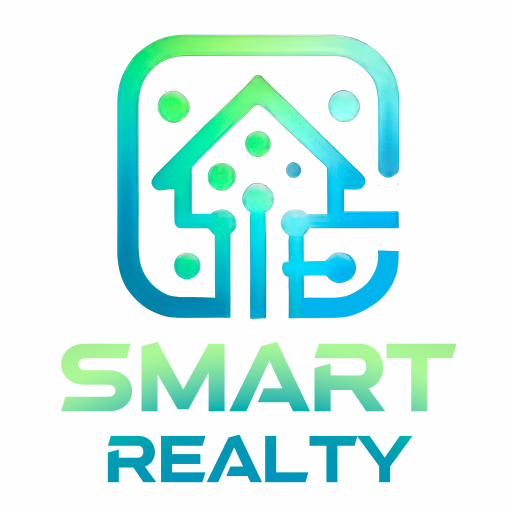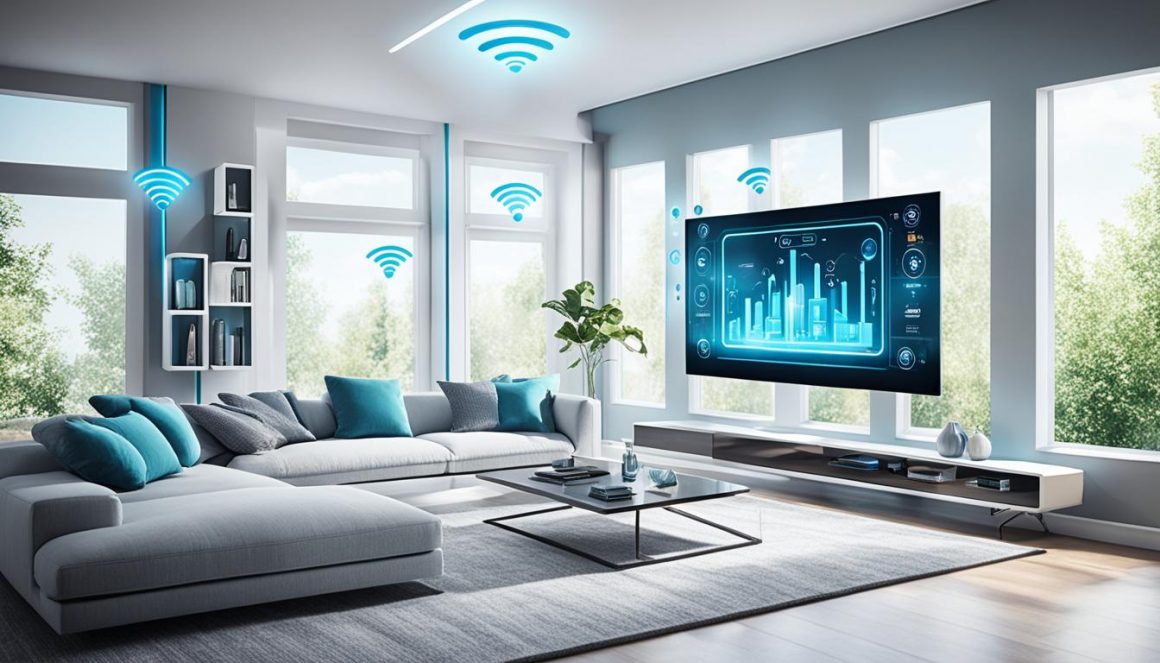Welcome to the world of smart home energy management! In this article, we will introduce you to the concept of energy management in smart home technology and how it can benefit you. Smart home energy management systems are designed to simplify, reduce, and efficiently manage energy consumption in your home. By integrating smart devices, renewable energy sources, and intelligent control systems, you can optimize energy usage and reduce reliance on the grid.
The ENERGY STAR Smart Home Energy Management Systems (SHEMS) program recognizes smart home systems that help simplify, reduce, and manage energy consumption. A SHEMS package typically includes an ENERGY STAR certified smart thermostat, lighting, and monitor/control plug loads. Additional products and services, such as ENERGY STAR appliances, EV chargers, and smart security, can be added. The package is fully customizable to fit your individual lifestyle needs.
Energy consumption is simplified through scheduling smart devices, suggesting energy-saving actions based on usage patterns, and automatically controlling devices based on occupancy. By harnessing the power of technology, smart homes can optimize energy usage, reduce costs, and minimize environmental impact.
Key Takeaways:
- Smart home energy management systems simplify, reduce, and manage energy consumption in your home.
- ENERGY STAR Smart Home Energy Management Systems (SHEMS) recognize energy-efficient smart home systems.
- Smart home energy management packages are customizable to fit individual lifestyle needs.
- Energy consumption is simplified through scheduling smart devices and automatically controlling them based on occupancy.
- Integrating smart devices, renewable energy sources, and intelligent control systems can optimize energy usage and reduce reliance on the grid.
Benefits of Smart Home Energy Management
Energy management in smart homes offers several benefits, including increased energy efficiency, which reduces costs and environmental impact. Through automation and intelligent control of devices, smart homes optimize energy usage, reducing wastage and maximizing efficiency. Smart home technology allows for the monitoring and management of energy consumption, enabling you to identify energy-saving opportunities and make informed decisions.
By integrating renewable energy sources and energy storage, smart homes can further enhance sustainability and reduce reliance on the grid. The seamless integration of solar panels, for example, allows you to generate clean energy on-site, reducing your carbon footprint. Energy management software provides real-time insights into energy consumption, empowering you to track your usage and identify areas for improvement.
“Smart home energy management systems are the future of sustainable living. By utilizing advanced technology and intelligent automation, these systems enable homeowners to optimize energy usage, resulting in significant energy savings and a greener environment.”
With the ability to automate lighting, heating, cooling, and other devices based on occupancy and time of day, smart homes ensure that energy is used efficiently, while providing you with optimal comfort and convenience. By using smart power strips and plugs, you can easily control and manage power to different devices, reducing standby power and unnecessary energy usage.
The benefits of smart home energy management include:
- Increased energy efficiency in smart homes
- Cost savings through reduced energy consumption
- Sustainable energy management for a greener future
- Improved comfort and convenience through automation
- Real-time monitoring and control of energy usage
- Integration of renewable energy sources for cleaner power
By harnessing the power of smart home energy management, you can take control of your energy usage, save money, and contribute to a more sustainable future.
Comparison of Energy Efficiency in Smart Homes
| Traditional Homes | Smart Homes |
|---|---|
| Limited control over energy consumption | Intelligent automation for optimized energy usage |
| No real-time monitoring of energy usage | Real-time insights and data on energy consumption |
| No integration of renewable energy sources | Seamless integration of solar panels and other renewable sources |
| Higher energy bills and environmental impact | Lower energy bills and reduced carbon footprint |
Smart Thermostat Technology in Energy Management
Smart thermostats are an essential element of energy management in smart homes. These innovative devices utilize smart technology to optimize energy usage and enhance overall efficiency. By learning and adapting to your behavior and preferences, smart thermostats automatically adjust temperature settings to ensure optimal energy efficiency. This helps you save both energy and costs.
One of the key advantages of smart thermostats is their remote control capabilities. Through dedicated mobile apps, you can monitor and adjust temperature settings from anywhere, at any time. This level of control puts the power of smart energy usage directly into your hands, providing convenience and flexibility.
Smart thermostats intelligently manage your home’s heating and cooling systems, thereby significantly reducing energy consumption. They use data from various sensors to determine the optimal temperature for different times of the day and adjust accordingly. This proactive approach to energy management can lead to substantial energy savings over time.
With smart thermostats, you can enjoy a comfortable living environment while simultaneously reducing your carbon footprint and energy costs.
| Benefits of Smart Thermostat Technology | |
|---|---|
| Energy Efficiency | Smart thermostats optimize energy usage, reducing unnecessary heating and cooling and resulting in significant energy savings. |
| Cost Savings | By reducing energy consumption, smart thermostats can lower your utility bills, saving you money in the long run. |
| Convenience and Control | Remote control capabilities allow you to adjust temperature settings and monitor energy usage from anywhere using your smartphone or tablet. |
| Environmental Impact | Smart thermostats help reduce carbon emissions by promoting energy-efficient heating and cooling practices. |
By incorporating smart thermostat technology into your energy management system, you can take full control of your home’s energy usage while enjoying a comfortable living environment. The convenience, energy savings, and positive environmental impact make smart thermostats a valuable addition to any smart home setup.
Energy Monitoring in Smart Homes
Energy monitoring is a critical component of smart home energy management systems. By providing real-time information on energy consumption, smart meters and energy monitoring devices empower users to track usage patterns and identify energy-saving opportunities. With this valuable data, smart homes can optimize energy usage and identify energy-hungry appliances, ultimately reducing waste and promoting efficiency.
Smart meters and energy monitoring devices offer insights and recommendations, allowing users to make informed decisions about their energy usage. By understanding how and when energy is being consumed, homeowners can take proactive measures to reduce their carbon footprint and lower energy costs.
Imagine receiving alerts on your smartphone indicating high energy consumption during certain times of the day. This information prompts you to investigate further and discover that your air conditioning system is running excessively while no one is home. With this knowledge, you can adjust your home’s system settings to align with your occupancy patterns and significantly reduce energy waste.
“Energy monitoring systems provide a valuable tool for managing energy consumption in smart homes. By understanding how energy is being used, homeowners can make better-informed decisions on how to save energy and reduce costs.”
Real-Time Data at Your Fingertips
Energy monitoring systems offer real-time data that enables users to track energy usage at the device level. This detailed information empowers homeowners to identify energy-hungry appliances and make necessary adjustments to minimize their overall energy consumption. By having a clear picture of your energy usage, you can take control of your household energy management and make meaningful changes to reduce waste.
- Track energy consumption patterns throughout the day
- Identify energy-saving opportunities
- Make informed decisions about energy usage
Thanks to energy monitoring in smart homes, you can say goodbye to the days of unknowingly leaving lights on or devices plugged in and wasting valuable energy. By adopting this technology, you can actively participate in energy conservation and make a positive impact on both your financial bottom line and the environment.
Optimizing Your Energy Usage
Energy monitoring is not just about tracking energy consumption; it’s about optimizing your energy usage and finding ways to be more efficient. By identifying trends and patterns in your energy consumption data, you can make informed decisions that allow you to maximize energy savings without sacrificing comfort or convenience.
“Energy-monitoring devices provide homeowners with the necessary tools to optimize energy usage in their smart homes. By analyzing real-time data, users can identify energy-saving opportunities and take proactive measures to reduce energy waste.”
For example, energy monitoring systems can provide recommendations on temperature settings, suggesting optimal thermostat settings to minimize energy usage while maintaining a comfortable indoor environment. They can also provide insights on standby power consumption, helping you identify and eliminate energy drains that often go unnoticed.
With energy monitoring in smart homes, you are empowered to make strategic decisions that positively impact both your energy bills and the environment. By actively managing your energy consumption, you can contribute to a more sustainable future while enjoying the benefits of a smart and efficient home.
Integration of Renewable Energy Sources
Smart homes have the capability to integrate renewable energy sources, such as solar panels, to generate clean and sustainable energy directly on-site. By harnessing the power of renewable energy, smart homes can significantly reduce their reliance on the grid, lower carbon emissions, and contribute to a greener future.
Energy management systems play a crucial role in optimizing the usage and storage of renewable energy in smart homes. These systems ensure maximum efficiency and cost savings by intelligently managing the generation, consumption, and storage of clean energy.
| Benefits of Integrating Renewable Energy | Smart Home Solutions |
|---|---|
|
|
| Optimizing Renewable Energy Usage | Sustainable Energy Management |
|
|
By integrating battery storage systems, smart homes have the capability to store excess energy generated by renewable sources. This stored energy can be utilized during high-demand periods or power outages, ensuring a continuous and reliable energy supply.


This comprehensive integration of renewable energy sources not only allows smart homes to reduce their carbon footprint but also offers long-term cost savings. By utilizing sustainable energy management practices, smart homes can contribute to a more eco-friendly and energy-efficient future.
Smart Home Automation and Energy Savings
Smart home automation is a key factor in achieving significant energy savings. By automating devices and appliances, your smart home can optimize energy usage based on occupancy, time of day, and your personal preferences.
One area where smart home automation can make a significant impact is lighting. Automated lighting systems not only offer convenience but also contribute to energy efficiency. These systems can adjust brightness levels based on natural light conditions and turn off when no one is present in a room. By eliminating unnecessary energy consumption, you can reduce your electricity bills and contribute to a more sustainable future.
In addition to lighting, smart power strips and plugs play a crucial role in managing power consumption. These devices allow you to control and manage power to different devices, preventing stand-by power and reducing unnecessary energy usage. By cutting off power to devices that are not in use, you can further reduce your energy consumption and save money.
“Smart home automation allows you to optimize energy usage based on your specific needs and preferences, providing greater control and efficiency.”
By integrating automation into your smart home system, you can achieve optimal energy savings without sacrificing comfort or convenience. Automated systems can intelligently adjust thermostat settings, turn off appliances when not in use, and optimize energy usage based on your daily routines.
Now, let’s take a look at a comprehensive table that summarizes the energy-saving benefits of smart home automation:
| Energy-Saving Benefits of Smart Home Automation |
|---|
| Optimizes energy usage based on occupancy |
| Adjusts lighting levels based on natural light |
| Turns off devices and appliances when not in use |
| Reduces stand-by power and unnecessary energy consumption |
| Provides greater control and efficiency |
As you can see from the table, smart home automation offers a wide range of energy-saving benefits. By taking advantage of these capabilities, you can significantly reduce your energy consumption, lower your monthly bills, and contribute to a more sustainable future.
Now, let’s take a closer look at the impact of smart home automation on energy savings:
The Impact of Smart Home Automation on Energy Savings
- Reduces energy consumption by optimizing device usage
- Minimizes stand-by power and eliminates unnecessary energy waste
- Increases overall energy efficiency and reduces monthly utility bills
- Provides real-time energy monitoring and insights for informed decision-making
- Integrates with renewable energy sources for a greener, more sustainable home
By implementing smart home automation solutions, you can achieve substantial energy savings while enjoying a more comfortable and convenient living environment.
In the next section, we will explore the role of energy management software in optimizing energy usage in smart homes.
The Role of Energy Management Software
Energy management software is a critical component of smart home energy management systems. It empowers you to monitor, control, and optimize your energy usage in real-time, providing a comprehensive solution for efficient energy management. With energy management software, you can take charge of your energy consumption and make informed decisions to maximize savings and minimize environmental impact.
One of the key features of energy management software is the ability to monitor your energy usage. By accessing detailed energy consumption data, you can understand how and when you’re consuming energy in your home. This information allows you to identify energy-saving opportunities and make adjustments accordingly. Whether it’s detecting energy-intensive appliances or pinpointing inefficient usage patterns, energy management software helps you gain valuable insights to optimize your energy consumption.
In addition to monitoring, energy management software enables you to control and adjust your smart devices and systems. You can set energy-saving schedules for your appliances and devices, ensuring they operate efficiently and only when needed. For example, you can schedule your thermostat to adjust temperature settings based on your occupancy patterns, optimizing both comfort and energy consumption. By having full control over your smart home devices, you can customize your energy usage to align with your lifestyle and preferences.
Energy management software goes beyond monitoring and control, offering advanced features to further enhance your energy management capabilities. You can receive energy usage alerts and notifications, keeping you updated on any unusual consumption patterns or potential energy-saving opportunities. This real-time feedback empowers you to take immediate action and make adjustments to reduce energy waste.
“With energy management software, you have the power to monitor, control, and optimize your smart home energy usage, which means more savings and a greener lifestyle.”
Furthermore, energy management software allows for seamless integration with other smart devices and systems in your home. It provides a centralized platform for managing all aspects of your energy consumption, enabling you to oversee and control multiple devices simultaneously. Whether it’s your smart thermostat, lighting, or appliances, you can access everything from a single interface, streamlining your energy management efforts.
By utilizing energy management software in your smart home, you can unlock the full potential of smart home energy solutions. It puts you in control, allowing you to optimize your energy usage, reduce costs, and promote sustainable living. With real-time monitoring, intelligent control, and seamless integration, energy management software is a powerful tool for maximizing your smart home’s energy efficiency.


Future Trends in Smart Home Energy Management
As technology continues to advance, the future of smart home energy management holds great promise. Innovations in technology, coupled with the increasing availability of renewable energy sources, are driving profound changes in this field. Here are some key trends that are shaping the future of smart home energy management:
1. Optimization through Artificial Intelligence and Machine Learning
Artificial intelligence (AI) and machine learning algorithms are being developed to optimize energy usage in smart homes. These intelligent systems can analyze data from various sources, such as weather, occupancy patterns, and energy prices, to make real-time adjustments and suggest energy-saving actions. By continuously learning from user behavior, AI-powered solutions can adapt and fine-tune energy management strategies to maximize efficiency.
2. Integration with Electric Vehicle Charging Infrastructure
The integration of smart homes with electric vehicle (EV) charging infrastructure is an emerging trend that brings together sustainable energy management and transportation. By leveraging solar power or stored energy from the grid, smart home systems can charge EVs in an environmentally friendly manner. This integration enables homeowners to efficiently utilize renewable energy and further reduce their carbon footprint.
3. Enhanced Energy Storage and Management
Smart homes of the future will feature more advanced energy storage solutions, such as high-capacity batteries. These energy storage systems can store excess energy generated from renewable sources, like solar panels, for later use. By optimizing energy storage and management, smart homes can efficiently utilize renewable energy, reduce dependency on the grid, and ensure uninterrupted power supply during peak demand or outages.
4. Interconnectivity with Smart Grids
Interconnectivity between smart homes and smart grids is another significant trend in energy management. Smart homes can communicate and exchange information with the grid, allowing for better coordination of energy usage and demand. This bidirectional flow of information enables homeowners to take advantage of dynamic pricing schemes, time-shift energy consumption, and actively participate in demand response programs, all while optimizing energy usage and reducing costs.
5. Expansion of Energy Management Software and Apps
Energy management software and mobile apps will continue to evolve, providing homeowners with more comprehensive and user-friendly tools to monitor and control energy usage. These intuitive platforms will offer real-time energy consumption data, personalized recommendations, and remote control capabilities for smart devices. Enhanced integration with voice assistants and smart speakers will further simplify the management of energy in smart homes.
“The future of smart home energy management is driven by innovation, sustainability, and optimization. Advancements in AI, integration with electric vehicle charging infrastructure, enhanced energy storage, interconnectivity with smart grids, and the expansion of energy management software are shaping the way we manage and consume energy in our homes.”
Conclusion
Smart home energy management systems are revolutionizing the way we manage energy in our homes. By integrating smart devices, renewable energy sources, and intelligent control systems, smart homes can optimize energy usage, resulting in significant benefits for homeowners. Not only do these systems increase energy efficiency and reduce costs, but they also contribute to a more sustainable environment.
With the help of energy management software, homeowners have the tools and insights needed to make informed decisions about their energy consumption. They can monitor and control energy usage in real-time, set energy-saving schedules, and access detailed energy consumption data. This empowers homeowners to take control of their energy usage and make changes that align with their goals for energy efficiency and sustainability.
As technology continues to advance, the potential for smart home energy management is only going to grow. Artificial intelligence and machine learning algorithms are being developed to further optimize energy usage in smart homes. The integration of electric vehicle charging infrastructure with smart home systems is another emerging trend that will enhance energy efficiency and sustainability.
Introduction to Energy Management in Smart Home Technology opens up a world of possibilities for homeowners to achieve energy efficiency, cost savings, and environmental sustainability. With the ability to seamlessly integrate smart devices, renewable energy sources, and advanced control systems, smart homes are at the forefront of the energy management revolution.

